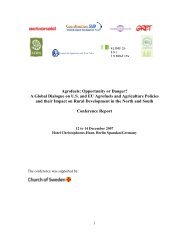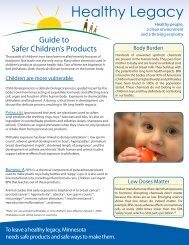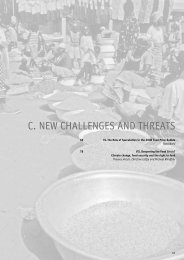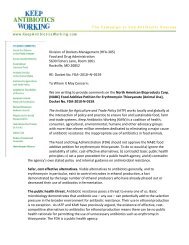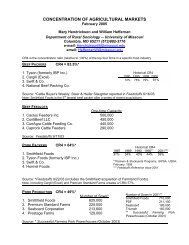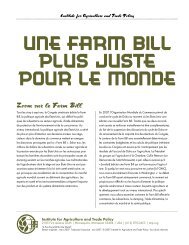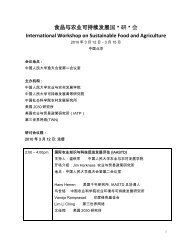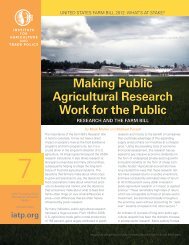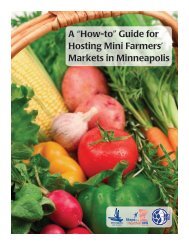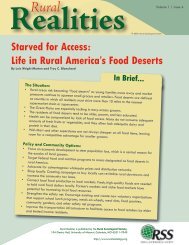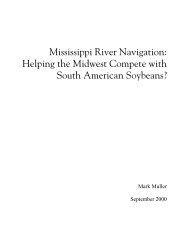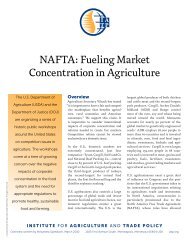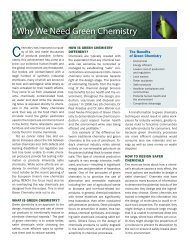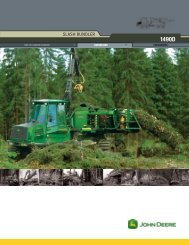IATP Hog Report - Institute for Agriculture and Trade Policy
IATP Hog Report - Institute for Agriculture and Trade Policy
IATP Hog Report - Institute for Agriculture and Trade Policy
You also want an ePaper? Increase the reach of your titles
YUMPU automatically turns print PDFs into web optimized ePapers that Google loves.
Section 4<br />
additional systems in the stages of design, permitting, or construction.<br />
Bion's clients include Murphy Farms, Continental Grain, <strong>and</strong> Smithfield<br />
Foods.<br />
The BionSoil conversion process is also touted as being able to control<br />
odors. However, in December 1999, the Illinois Attorney General filed a<br />
lawsuit against The Highl<strong>and</strong>s, LLC, a 3,650-sow, farrow-to-wean hog<br />
factory in Illinois, <strong>for</strong> alleged odor violations that occurred since the<br />
Highl<strong>and</strong>s opened in 1997. 64,65 Over 230 complaints of offensive odor<br />
from the facility had been lodged. Co-defendants in the suit are Murphy<br />
Family Farms, which owns the hogs <strong>and</strong> shares in the operation of the<br />
factory, <strong>and</strong> Bion Technologies, Inc., which designed <strong>and</strong> shares in the<br />
operation of the Highl<strong>and</strong>s' waste h<strong>and</strong>ling system. The Attorney General<br />
asked <strong>for</strong> an injunction to stop further violations of the law, <strong>for</strong> civil fines<br />
of up to $50,000 <strong>for</strong> each violation <strong>and</strong> an additional fine of $10,000 <strong>for</strong><br />
each day the violations continued.<br />
Some Strategies <strong>and</strong> Action Alternatives <strong>for</strong> Clean Air from<br />
Animal Production<br />
1. Call <strong>for</strong> <strong>and</strong> support the reclassification of animal factories as<br />
manufacturing entities rather than as agricultural.<br />
Rationale: Animal factories more nearly resemble manufacturing<br />
than farming. A farming classification exempts animal factories<br />
from some federal <strong>and</strong> state environmental regulations <strong>and</strong><br />
monitoring, to which they rightfully ought to be subject by virtue<br />
of the toxic <strong>and</strong> environmentally damaging emissions created in<br />
the normal course of their operations. The classification of hog<br />
factories as farms rather than industrial facilities prevents<br />
meaningful regulation. For example, the Illinois Supreme Court<br />
ruled that all hog farms, regardless of size, are agricultural in<br />
nature <strong>and</strong> may not be regulated by counties.<br />
2. Call <strong>for</strong> a nationwide ban on liquefying animal manure as a way of<br />
dealing with waste from animals raised <strong>for</strong> food. Ban all new<br />
construction of liquefied manure storage systems <strong>and</strong> require<br />
existing operations to phase in solid manure h<strong>and</strong>ling over the next<br />
10 years.<br />
Rationale: Leakage from liquid manure storages can be gradual<br />
<strong>and</strong>, if failures occur, the discharges can be catastrophic. Waste<br />
discharges from the largest hog factories (<strong>and</strong> other confined<br />
animal feeding operations (CAFOs)) are currently permitted under<br />
the National Pollution Discharge Elimination System (NPDES)<br />
program by the U.S. Environmental Protection Agency. Because<br />
of loopholes in the regulations, inadequate permit conditions, <strong>and</strong><br />
http://www.iatp.org/hogreport/sec4.html (9 of 15)2/27/2006 3:50:10 AM



